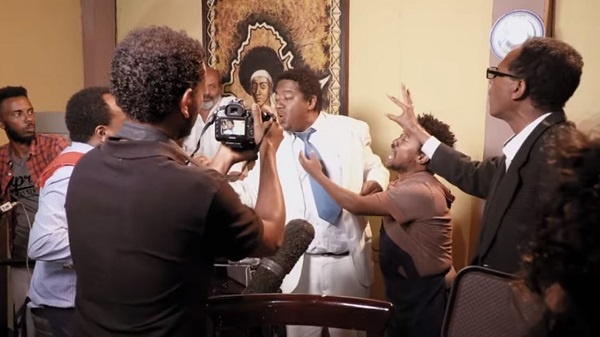
Exploring the making of a political satire show, Min Litazez, offers insight into the growing pains of Ethiopia’s new democracy.
ADDIS ABABA (Al Jazeera) – In a compound on the edge of Addis Ababa – next to a cluster of houses and a busy primary school – is a large corrugated iron shack.
Inside is a cafe. Not an ordinary cafe, but the set of Ethiopia’s first political satire show to be broadcast on state television – Min Litazez, which translates to “How may I serve you?”.
“This is our mini Ethiopia,” says creator and director Behailu Wase, who grew up in the same compound from where he now airs his popular show. “A lot of ideas are discussed here.”
In the three seasons it has been on air, Min Litazez has built an enthusiastic and loyal audience among a population starved for political commentary and a new kind of comedy after almost 27 years of dictatorship during which such things would have been unthinkable.
But after Prime Minister Abiy Ahmed came to power in 2018, he instituted a number of political and economic reforms, including loosening restrictions on the media and freedom of speech.
The sitcom-satire is set in a cafe, meant to be a metaphor of the country as a whole. In each episode, the cafe owner’s life tries to mirror and reflect the challenges faced by the country’s new leadership.
Past episodes have dealt with issues like government inefficiency, ethnic nationalism and authoritarianism – despite attempts to censor some of the content and, at times, even temporary suspension of the show itself.
“We’re not just trying to make people laugh, but raise awareness because we want to create a better country,” Behailu says.
He acknowledges that ethnic politics are a thorny issue in Ethiopia, with sensitivities on all sides. But he adds: “We don’t take sides. We reflect what we see, and we criticize everything we think should be criticized.”
Each week, Behailu and his team go up against the clock to conceptualize, write, produce, shoot, edit and deliver a new episode for broadcast. They never shoot ahead of time because they insist on including the latest news and events in the script.
Each Monday, the team brainstorms to discuss what is topical and urgent, and they spin it into the outline of an episode. Behailu then retreats to a nearby restaurant and writes into the night.
By Wednesday they are in the studio shooting. On Thursday and Friday, they edit. And by Saturday the finished episode is taken on a flash drive to the building that houses Fana, Ethiopia’s state-funded television network.
“I like exchanging ideas with my brilliant friends,” Behailu says, adding that a big part of his Ethiopia is raising political and social issues through Min Litazez.
In this film, we follow Behailu and his team – getting a glimpse into their creative process and discipline – and take a unique look at Ethiopia’s fast-changing political landscape and the public reaction to it.
Note: ‘Min Litazez’ was once again taken off air in September 2019. The series’ creators are determined to restart production as soon as possible.
Source: Al Jazeera
